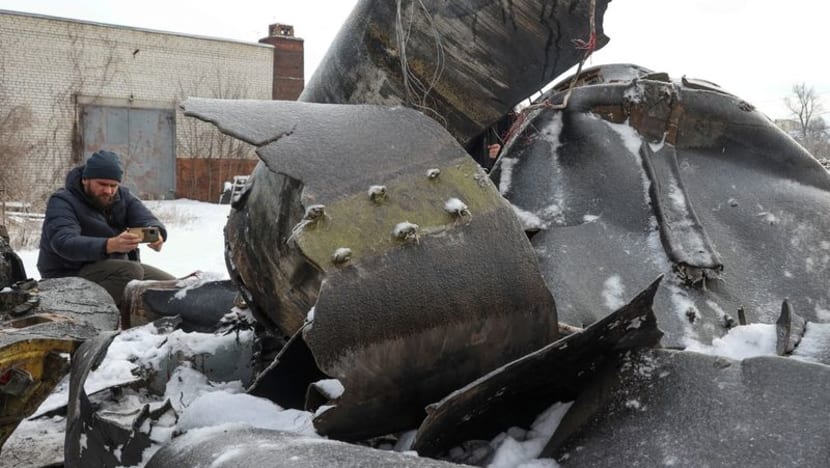North Koreans are a ‘stopgap’ as Russia seeks troops for Ukraine war: Analysts
Observers said North Korea’s latest successful testing of one of its most powerful missiles signals Russia may be providing new technology or expertise to Pyongyang.

A man photographs parts of an unidentified missile, which Ukrainian authorities believe to be made in North Korea and was used in a strike in Kharkiv, as Russia's war on Ukraine continues, in Kharkiv, Ukraine Jan 6, 2024. (File Photo: REUTERS/Vyacheslav Madiyevskyy)

This audio is generated by an AI tool.
As North Korean soldiers in Russian uniforms march towards Ukraine, analysts said Pyongyang’s involvement signals both a growing strategic cooperation between the allies and a reflection of Moscow’s desperation on the frontlines.
These troops from the hermit kingdom are a temporary measure to help replenish Russian forces on the battlefield, said Mason Richey, an international politics associate professor at the Hankuk University of Foreign Studies.
“The North Koreans are stopgap. (Russian President Vladimir) Putin has been losing ... huge numbers of troops on the ground,” he said.
“This would take him closer to needing (another) mobilisation ... which he has largely avoided because of political sensitivity.”
Reports show that Putin has been reluctant to draft ethnic Russians into the war, instead mobilising areas with high minority populations to avoid triggering anger in Moscow.
The Kremlin has also outsourced the fighting to mercenaries and foreign fighters acting on their own, and usually for financial reasons. But the North Korean soldiers will be the first who have been ordered by a state to join the war.
Analysts said that in return, Pyongyang is likely receiving financial assistance as well as energy, food and military technology from Moscow.
They pointed to North Korea’s test-firing of one of its newest and most powerful missiles on Thursday (Oct 31) as a sign that Russia may be providing new technology or expertise to Pyongyang.
“This just clarifies, in some sense, that the Indo Pacific and Euro Atlantic theatres are linked in some way,” said Richey.
The "ICBM-class" missile had flown for longer than any other previously tested by the North, said Japan.
Edward Howell, a Korea Foundation Fellow at British think tank Chatham House, said the missile launch highlights worries that Pyongyang is increasing the scope and sophistication of its nuclear development and missile delivery systems.
“This is concerning because it portends in the future that if Russian technology does end up in North Korea's direction, then (North Korean leader) Kim Jong Un will be able to accelerate the scope and sophistication of his missile capabilities,” he told CNA’s East Asia Tonight programme.
The Kremlin has not denied that North Korean troops have arrived in Russia. It also declined to comment when asked if Moscow was helping North Korea to develop its missile and other military technologies.
CONCERNS ABOUT ESCALATION
South Korea and the United States said an estimated 10,000 North Korean troops have been deployed to Russia for its war in Ukraine.
Pyongyang and Moscow signed a defence pact earlier this year, where they agreed to immediately provide military assistance if either is attacked.
Related:
The North's latest deployment of troops to Russia has raised concerns of further escalations both in Ukraine, as well as on the Korean peninsula, where both Koreas remain technically still at war.
Cha Du-Hyeogn, a principal fellow at South Korean think tank The Asan Institute for Policy Studies, said Seoul has two major concerns - the North gaining warfare experience, and the possibility of Russia transferring nuclear or missile technology to Pyongyang in return.
“If North Korean troops are actually deployed, it means they would gain modern combat experience from the Ukraine war, which ultimately poses an indirect threat to South Korea,” he said.
South Korea President Yoon Suk Yeol’s office has said that Pyongyang’s involvement poses a "great threat" to its security, adding Seoul may start supplying weapons to Ukraine if North Korean troops join Russia's war.
Observers were concerned that after this precedent, the Kremlin could also invite troops from other countries that it has significant influence over, such as Belarus or Syria, to fight its war.
However, on the other side of the battlefield, it is unlikely at this point for Ukraine’s allies to send foot soldiers to aid Kyiv, Richey said.
WHAT IS A SILENT CHINA SAYING?
So far, Beijing has been relatively quiet about both North Korea’s missile test and its deployment, despite urging from the US and South Korea to do more to curb Pyongyang’s provocative actions.
Some analysts suggested that China - North Korea’s closest ally for decades - could be trying to distance itself from the latest escalation.
Howell, who is also an international relations lecturer at the University of Oxford, said China is “caught between a rock and a hard place”.
“China has a dilemma. Up until now, China has been much more important to North Korea than Russia has,” he noted.
“It clearly wants to have a say on North Korea's foreign policy and on the Korean peninsula, but China is also very dissatisfied at how the West is responding to this ... with the US strengthening alliances with South Korea and Japan.”
Richey added Beijing could become “sufficiently irritated” with Pyongyang at some point, but noted that developments so far are unlikely to cause any strategic shifts in its foreign policies.















